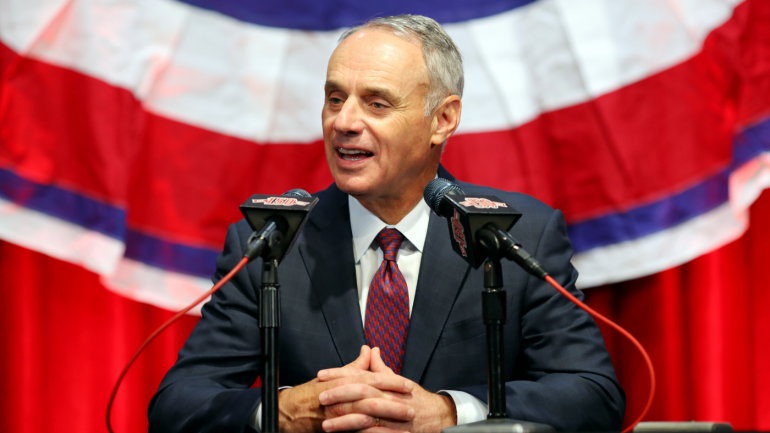
The first ever Wild Card Series is just one week away. MLB expanded the postseason to 16 teams this season in part to make money after the shutdown and in part to make things a little more fair in a shortened season. Talented teams that stumbled a bit during the regular season still have a chance to play for a World Series championship.
The best-of-three Wild Card Series will be played entirely in the higher seed's home ballpark. After that, the postseason will shift to bubbles in Southern California and Texas for the LDS, LCS, and World Series. In a conversation with USA Today's Bob Nightengale, commissioner Rob Manfred said MLB is "pressing ahead" with plans to have fans attend the NLCS and World Series.
Here's what Manfred told Nightengale:
"We are pressing ahead to have fans in Texas,'' said Manfred, with a ticket sales announcement expected soon. "One of the most important things to our game is the presence of fans. Starting down the path of having fans in stadiums, and in a safe and risk-free environment, is very, very important to our game.''
The entire NLCS and World Series will be played at the brand new Globe Life Field in Arlington, Texas. Texas is currently in Phase 3 of its reopening plan, which allows open-air stadiums to admit up to 50 percent capacity. Globe Field Field seats 40,300 and has a retractable roof, and MLB typically closes all roofs in the postseason to avoid potential weather delays.
When you try to put something inside a bubble, it bursts, and allowing fans into the ballpark for the NLCS and World Series seems like an unnecessary risk. There's money to be made, sure, but MLB and the MLBPA have worked extremely hard to get to this point. Would they really put it at all risk by allowing fans to attend as few as eight postseason games? It seems so.
"We still don't have rigorous enough testing and contact tracing to be confident we're catching every outbreak that actually happens at a stadium," epidemiologist Zachary Binney told Bill Shaikin of the Los Angeles Times recently. "I don't think I'll be convinced by October this is a safe thing to do, or that the risks are outweighed by the benefits. Is the revenue really going to make a difference to baseball?"
Manfred also discussed his recent comments regarding the expanded postseason format, specifically his desire (and the desire of the 30 owners) for the format to become permanent. Expanding the postseason in the future has nothing to do with competitive balance and integrity and everything to do with maximizing revenue, full stop. Here's what Manfred told Nightengale about the expanded postseason format:
"Look, 16 teams, was a really good solution for the unique environment we had in 2020,'' Manfred said. "But I want to be clear, when I talked about the expanded playoffs going forward before COVID ever hit, we never talked about 16 teams as a permanent solution. We never talked about more than 14 teams. Those plans addressed marginalizing the value of winning the division, and preserving the competitiveness through the regular season.
"The expanded playoffs cover a vast waterfront, but what we discussed was a very different format than we're seeing now.''
The 16-team postseason format would give more teams a shot at the World Series, sure, but there would undoubtedly be an effect on free agency and the competitive landscape. Why would an owner spend an extra $20 million or so when the only difference between 85 wins and 96 wins is home-field advantage in a best-of-three series? If you think more postseason spots means teams will try harder to compete, you haven't been paying attention. It'll be an excuse to hold a firm line on payroll.
Over the winter it was reported MLB was preparing to propose a 14-team postseason format in which the No. 1 seed in each league gets a bye to the LDS, and the Nos. 2-4 seeds are able to pick their opponent for the best-of-three Wild Card Series. Those plans came to a screeching halt once the pandemic forced MLB to shut down, though it sounds like Manfred & Co. are planning to broach them again after the season.
MLB and Manfred can not expand the postseason unilaterally. The MLBPA must agree to any changes. The players union agreed to the expanded format for 2020 and 2020 only. An expanded postseason for 2021 and beyond must be negotiated and it is a significant bargaining chip for the union. The owners want an expanded postseason -- badly -- and the MLBPA could use it to extract major concessions (free agency after four years? arbitration every year? expansion and 50-plus new jobs?).
Personally, I like the 10-team postseason format. The postseason should be inclusive, otherwise you risk watering down the 162-game regular season, and there needs to be a reward for winning the division. Otherwise teams have little incentive to get better. The 16-team format renders the division title relatively meaningless. The 14-team format is better, though that's still nearly half the league going into the tournament.
At this point, an expanded postseason format is an inevitability. The owners want it too much and the MLBPA's interests don't necessarily align with the interest of fans. The players will agree to an expanded format if it puts more money in their pocket and improves their working conditions. Competitive integrity and fairness will be a secondary concern.


















